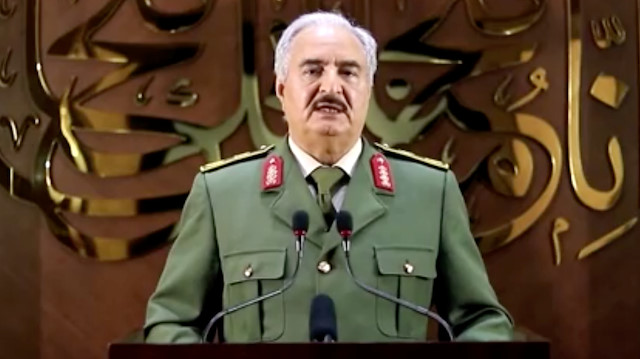
Former UK envoy in Tripoli Peter Millet seeks sanctions against warlord Haftar, tells EU nations to review position
Former British Ambassador in Libya Peter Millet has called for an investigation into the use of banned chemical weapons in Libya.
His tenure in the Libyan capital Tripoli in 2015-2018 had witnessed the Organization for the Prohibition of Chemical Weapons (OPCW), leading the elimination of the chemical weapons under active western diplomacy and removal of category two material to Germany for destruction.
He was responding to Libyan Interior Minister Fathi Bashaghe's statement that warlord Khalifa Haftar's forces had used chemical weapons against government forces on the Salah Al-Deen front, south of Tripoli.
The accusations were later confirmed by Canadian journalist Amru Salaheddine, who, while visiting field hospitals, found several soldiers with symptoms similar to those of epilepsy, usually caused by nerve gas.
In an exclusive interview with Anadolu Agency, Millet, who has served in several positions in the British diplomatic service since 1974, said the reports of using chemical weapons were dangerous and amounted to a war crime. He even asked European nations to reassess their judgment of supporting Haftar's campaign, which he described as a power grab. He also called for international sanctions against Haftar.
Anadolu Agency (AA): You have asked for an investigation into the use of banned chemical weapons in Libya. Did you have any reports of the use of chemical weapons and what sort of weapons have been used?
Peter Millett (PM): Reports on social media, including from an Egyptian/Canadian journalist working in Tripoli, Amru Salahuddin, mentioned a mortar releasing a yellow cloud and fighters falling to the ground shaking and unable to breathe.
These reports were then circulated further by the Interior Minister Fathi Bashaga and a UK-based Libyan Anas Gomati.
On April 25, the Acting Special Representative of the UN Secretary-General, Stephanie Williams, mentioned that she had spoken to the Minister of Interior, Fathi Beshaga about these very concerning reports.
She rightly noted that Libya was a signatory to international chemical weapons treaties and that the Organisation for the Prohibition of Chemical Weapons was in a position to investigate. I have not seen any news of further steps taken to investigate these reports.
- Haftar campaign a power grab
AA: Since you were associated with Libya as the envoy of the UK, why do European nations feel shy of supporting an elected UN-recognized government? And also, why do some European nations back the rebel group against the proper government?
PM: The motives of different governments is complex and based on their own political and commercial interests. Some have decided that supporting General Haftar's claim that he was fighting terrorism was a cause worth supporting. Perhaps they thought that backing him might bring stability to this troubled and divided country. Now that Haftar's campaign is a power grab, those judgments should be re-assessed.
AA: What is the way out of Libyan crises, keeping in view that rebel warlord Haftar walked out from dialogue in Moscow?
PM: The only way is through an UN-led process that includes a wide range of Libyan political, tribal, social, economic groups as possible. The process must be fully inclusive and secure from all the main military actors as well.
It should be based on a slow process of reconciliation with a focus on Libyans' collective national interest, binding together the disparate tribal, regional, and military groups into a common national narrative. The international community should unite - genuinely, not just in lip-service - behind the UN.
- Sanctions a tool for intentional community
AA: What is Britain's position on Libya and how it views the situation and the warning parties?
PM: I do not represent the British Government.
But I saw a recent statement issued by the Foreign Office expressing its continuing support for the Libyan Political Agreement (LPA) and the institutions established under it, including the Presidency Council and the Government of National Accord.
The UK has also consistently backed UN peace efforts. It should continue to do so actively and visibly.
AA: Many Libyans believe that the international community has not been serious in dealing with those obstructing the political process in Libya. Your response?
PM: Sanctions have been imposed against those who created obstacles to the political transition, including Aguleh Saleh, the President of the House of Representatives who has consistently undermined the LPA.
Sanctions were also used against some militia leaders, e.g. Saleh Badi. Sanctions are the main tool available to the international community.
There is a strong case for the use of sanctions against Khalifa Haftar given his rejection of the political process and the indiscriminate bombardment of Tripoli.
However, I expect his sponsors would work to prevent sanctions from being imposed.
Hello, the comments you share on our site are a valuable resource for other users. Please respect other users and different opinions. Do not use rude, offensive, derogatory, or discriminatory language.
The floor is all yours.








